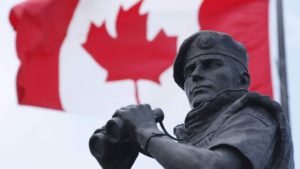
McLeod Group Blog by Carolyn McAskie, November 22, 2017
When the current government was voted in two years ago, it triumphantly announced that Canada was back on the international stage, signifying a clear break with the previous regime which had run its own version of “Canada first”, picking and choosing among international fora, denigrating the UN and cutting international development contributions. Nowhere was the difference between the two governments more marked than in their respective attitudes towards UN peacekeeping. It appeared that the new government was going to take us back to the glory days of our Nobel Peace Prize and 40 years of the blue berets.
So one year into its term, the government announced that Canada would once again become a peacekeeping nation, with a deployment of 600 troops and 150 police officers. The UN proposed Mali, a country where Canada has had a longstanding presence, and offered the post of Force Commander on the ground, reporting to a civilian head of an integrated mission. Hardly was the announcement out the door when the rot set in. Canada dithered on accepting the Force Commander post (apparently wanting to consult with US allies), as this would automatically have meant making good on its proposal to put a battalion into the Mali mission, and the opportunity was lost.
Throughout 2017, the Prime Minister and the Minister of Defence have talked about comprehensive and multidimensional re-engagements, language which signals their understanding of modern peace operations, meaning civilian-led political operations with military and development assets aimed at ensuring long-term peace. This is the model that brought peace to Liberia, Sierra Leone, Timor-Leste, Côte d’Ivoire, Burundi and others at a fraction of the costs of Afghanistan, which still has no peace. The UN manages up to 18 missions at a time, 120,000 personnel, on a relative shoestring of $8 billion a year, all with a very small headquarters capacity. The Afghanistan effort had over 125,000 troops, with Canada’s share alone costing $16 billion. The Democratic Republic of Congo, the longest-lasting and most challenging mission, has never been given more than 20,000 troops.
Now the government finds itself in the embarrassing position of hosting the current round of donor meetings on peacekeeping without a clear offer on the table. The result is the half-baked series of offers announced last week in Vancouver: 200 rapid response personnel, some equipment, maybe police to Haiti (where what used to be called CIDA has been supporting the local police force for years), a training commitment (previously a Canadian strength, now lost with the previous government’s dissolution of the Pearson Peacekeeping Centre), principles on child soldiers, and a fund to support the increased participation of women (from other countries). Nowhere is there mention of all the other things the Defence Minister had said we would do: addressing the root causes of conflict, conflict resolution, mediation, peacebuilding (which requires development investment), advancing the roles of women and youth in peace and security, and the perennial prevention of sexual exploitation and abuse. The issue of abuse is even more crucial to address now that we know it is not a UN-specific problem, but a problem of all militaries – including our own – and other male-dominated institutions worldwide.
So why has the commitment slipped? Where will this item sit on the government’s transparency tracker? Quite simply, the military has persuaded the politicians that they should not do this – they don’t like UN operations and have not kept up with the reforms of the last two decades. They would rather fight alongside their big brothers to the South than be caught dead (literally) with unfamiliar troops from far corners of the world. They prefer to ignore the fact that Canada, as a member of the United Nations, is obligated to be part of the solution. Rather than complaining about the shortcomings of the UN system (largely due to member states’ failure to finance it), Canada should be working with UN Headquarters to strengthen its capability.
There is another reason. The Defence Minister has said that the safety of personnel in uniform is a priority. Never mind the safety of Canadian humanitarian workers who go into war zones to deliver critical assistance, whether peacekeepers come in or not. Have we forgotten what armed forces are for, to defend the peace and provide security? You can’t do this from home. Canada, despite the outpouring of gratitude this past Remembrance Day to the 100,000 who gave their lives in two World Wars, will no longer accept the putting of one soldier in harm’s way.
Finally, there are other media and political voices that still say that these wars, which the UN is left to handle with limited resources, are not in Canada’s interest to solve. But when we look at one of the most critical issues of our time, the massive growth of refugees and “illegal” migrants, fleeing conflict and persecution, then surely it’s about time we invested more in solving social, economic, environmental and political problems all over the world. The world has long recognized the link between poverty and fragility, on the one hand, and conflict and insecurity, on the other. Not only are the consequences already coming to our shores, but our unwillingness to share this burden risks undermining our broader political objectives of contributing to global solutions, which may hold such consequences as hurting our bid for a seat on the UN Security Council.
